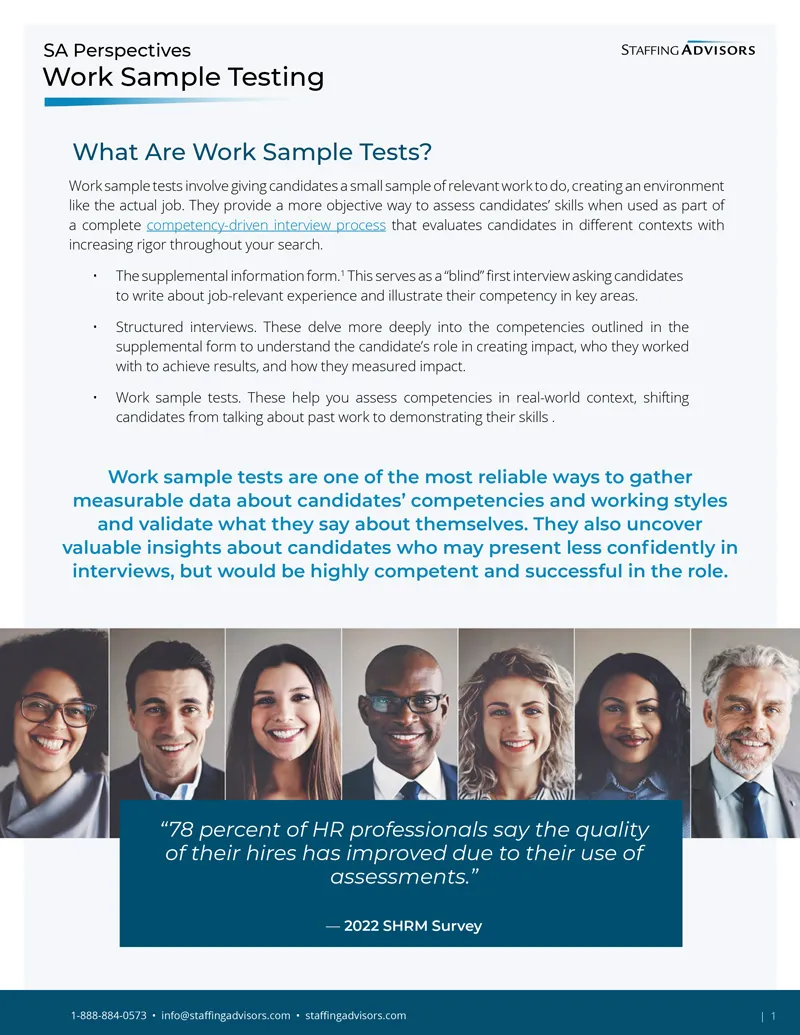Your goal as a hiring manager is to choose the candidate most likely to succeed in your role. But how do you know who that is? Resumes and traditional interviews are poor predictors of success on the job, and relying on them alone leaves the door open to unintentional bias. The Staffing Advisors team recommends using a variety of skills-based assessments throughout the hiring process to ensure a fair, inclusive, and competency-based approach.
Work sample tests are one of the most reliable ways to gather measurable data about candidates’ competencies and working styles and validate what they say about themselves. They also uncover valuable insights about candidates who may present less confidently in interviews but would be highly competent and successful in the role.
“78 percent of HR professionals say the quality of their organization’s hires has improved due to their use of assessments.”
— SHRM
What Are Work Sample Tests in Hiring?
Work sample tests involve giving candidates a small work assignment to discuss in their next interview. They are part of our competency-driven interview process that evaluates candidates in different contexts with increasing rigor at each step. Key elements of our process include:
- Supplemental information. This serves as a “blind” first interview, asking candidates to write about job-relevant experience and illustrate their competency in key areas.
- Structured interviews. These delve more deeply into the competencies outlined in the supplemental form to understand the candidate’s role in creating impact, who they worked with to achieve results, and how they measured impact.
- Work sample tests. These help you assess competencies in real-world context, shifting candidates from talking about past work to demonstrating their skills.
If you’d like to learn how this approach can help you find and retain exceptional candidates who will drive impact in your nonprofit or association, contact the Staffing Advisors team. We would love to work with you.
How to Design a Work Sample Test
The content of your work sample exercise will vary by career level and functional area. Find advice on developing an assessment for a senior-level executive here. Here is a basic structure to follow:
- Decide what you want to learn. Consider the 3-5 key skills outlined in your position overview and supplemental information form. What do you want to see in action? What will convince you that this person has the skills to do the job and collaborate with your team?
- Identify a challenge this person may face in their day-to-day work. Choose a task that mirrors something that will fall on their desk and that a candidate could complete in about two hours (we recommend giving them a week to do so). The work assignment should reflect the complexity and demands of the role and provide insights that interview questions cannot.
- Include some constraints or resources for the candidate to work with. Set parameters and be specific. Give candidates real information to work with to simulate your work environment. Examples include standard operating procedures, a sample portfolio of products, an org chart, membership surveys, sales analyses, etc.
- Develop evaluation criteria. How will you measure success? Are there multiple viable approaches to the work? Remember, you aren’t looking for the “right” answer. You’re looking for thought processes that will benefit your team. Use the same criteria for every candidate.
- Ask candidates to come prepared to discuss. A deliverable alone tells you nothing about how a candidate arrived at their conclusion or how they will pivot when something new comes up. Even if a deliverable is part of the assignment, tell the candidate that your goal is to understand the thinking behind their work.
How to Discuss a Work Sample Test
The discussion is the most important part of the work sample assignment. Think of it this way: AI-driven tools can create all kinds of deliverables fairly well (from a SWOT analysis to a slide deck and more). Without a discussion, reviewing a project that technology could easily do isn’t going to tell you much. Allow candidates to show their real value—how well they collaborate, how well they understand the issues, and how their perspective would complement your team’s skills. We can’t overemphasize the importance of talking about the work. Both you and the candidate gain valuable perspective in the conversation.
Ask candidates to “Come prepared to discuss how you would handle (some challenge).” Follow up with detailed questions. Propose a roadblock and ask how they might tweak their approach. Ask what they would change if different stakeholders were involved. Ask them to explain judgment calls and connect the work to past experiences. Challenge their thinking.
The Business Benefits of Work Sample Testing
Better Quality Hires and More Diverse Teams
Interviews favor candidates who are good at talking about work, while skills-based assessments favor candidates who are good at working. Including both in your process reduces the potential for bias toward candidates with easy confidence or familiar credentials, invites candidates from various backgrounds to showcase their skills, and leads to better quality hires and more diverse teams.
“Being around people who are different from us makes us more creative, more diligent and harder-working.”
— Katherine W. Phillips, Senior Vice Dean, Columbia Business School and advocate for diversity, equity, and inclusion in the workplace.
More Accurate at Predicting Success on the Job
Extensive research shows that work sample testing is a more accurate predictor of success than the interview itself. A skills test allows you to see a candidate’s cognitive style, how they solve problems with a given set of resources, whether they understand the context of the position in your organization, and how they organize their thinking.
“I’ve seen work sample tests change the hiring decision many times. Many clients go into the final interviews with their candidate pick in mind. But after reviewing and discussing the sample work, they choose a different candidate.”
— Staffing Advisors Vice President of Client Engagement Aileen Hedden
Builds Commitment and Trust With Candidates
Candidates appreciate the opportunity to visualize themselves in the position and think about how their skills align and whether the work is something they want to do. They also want to demonstrate their strengths and increase their chances of getting hired. And for candidates drawn from traditionally underrepresented backgrounds, skills tests send a powerful signal that you evaluate candidates consistently and fairly.
Improves Your Onboarding and Training
Skills assessments will reveal each candidate’s strengths and weaknesses in the context of your specific job and organization. This insight can be invaluable in structuring onboarding and training to give them the support they need to succeed in the role, leading to a better employee experience and long-term retention.
“I’ve seen cases where two candidates were closely matched, but one had an advantage with more experience on their resume. After the work sample, the client realized that experience didn’t translate into the skills and working style they were looking for. Having a deeper understanding of each candidate’s skills and the support they will need can inform your selection and the offer.”
— Staffing Advisors Project Director Lilly Khan
Saves Time and Resources
While developing work sample tests requires effort for your hiring team, these assessments save time and resources in the long run by helping you avoid hiring the wrong person or investing more time in candidates who are not a good fit for the role. The additional information you gain helps you more clearly identify the tradeoffs you would make with one candidate over the other.
Take It With You
For work sample examples from association and nonprofit executive searches in different functional areas and career levels, download SA Perspectives: Work Sample Testing and share with your team. (No signup or email required.)
More Resources
Read our Employer Guide to Interviewing for a step-by-step guide on how to develop a well-planned interview sequence that reduces the potential for bias and error and more reliably predicts success on the job than any other hiring practice, including what to discuss, how to assess cultural add, how to structure the first and second interviews, work sample testing, and more.

